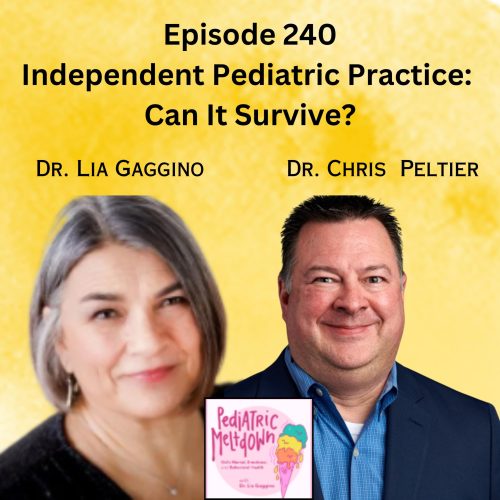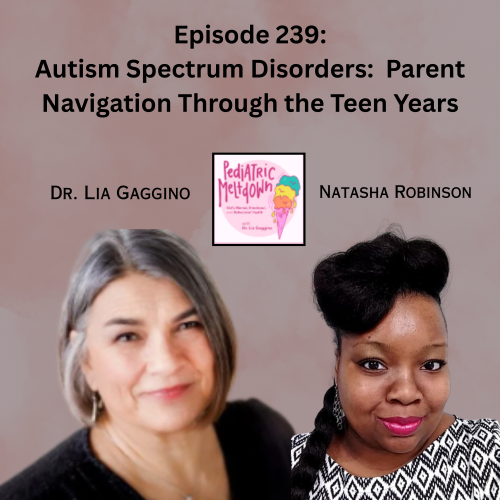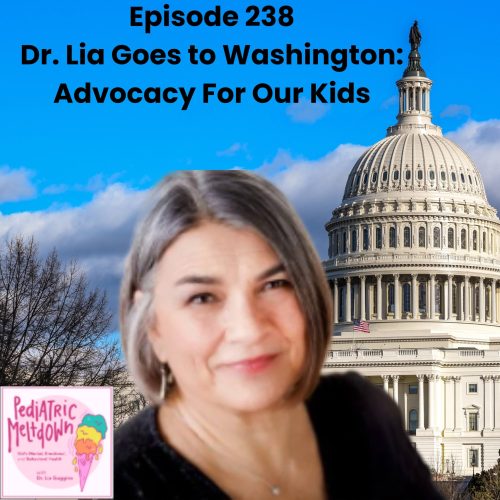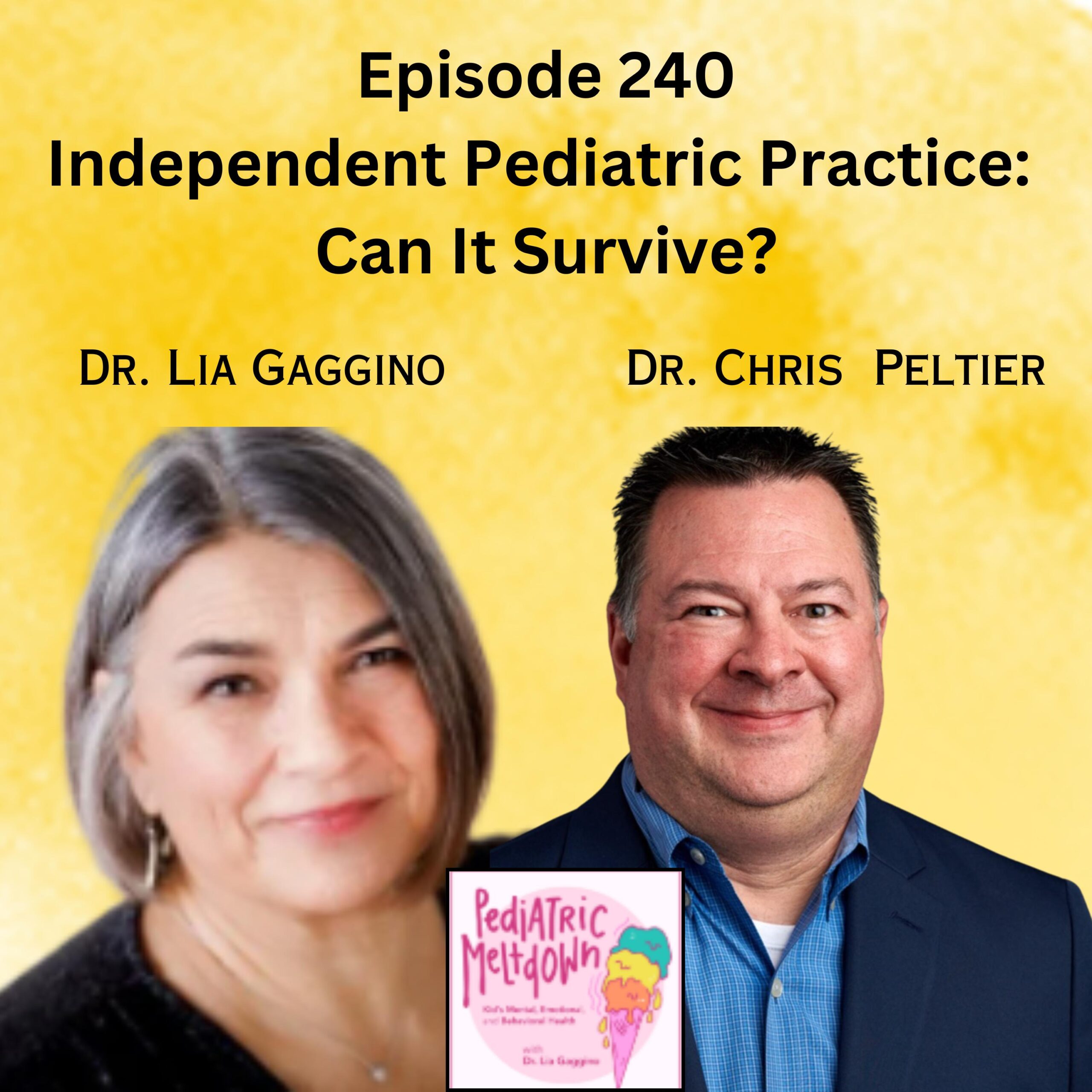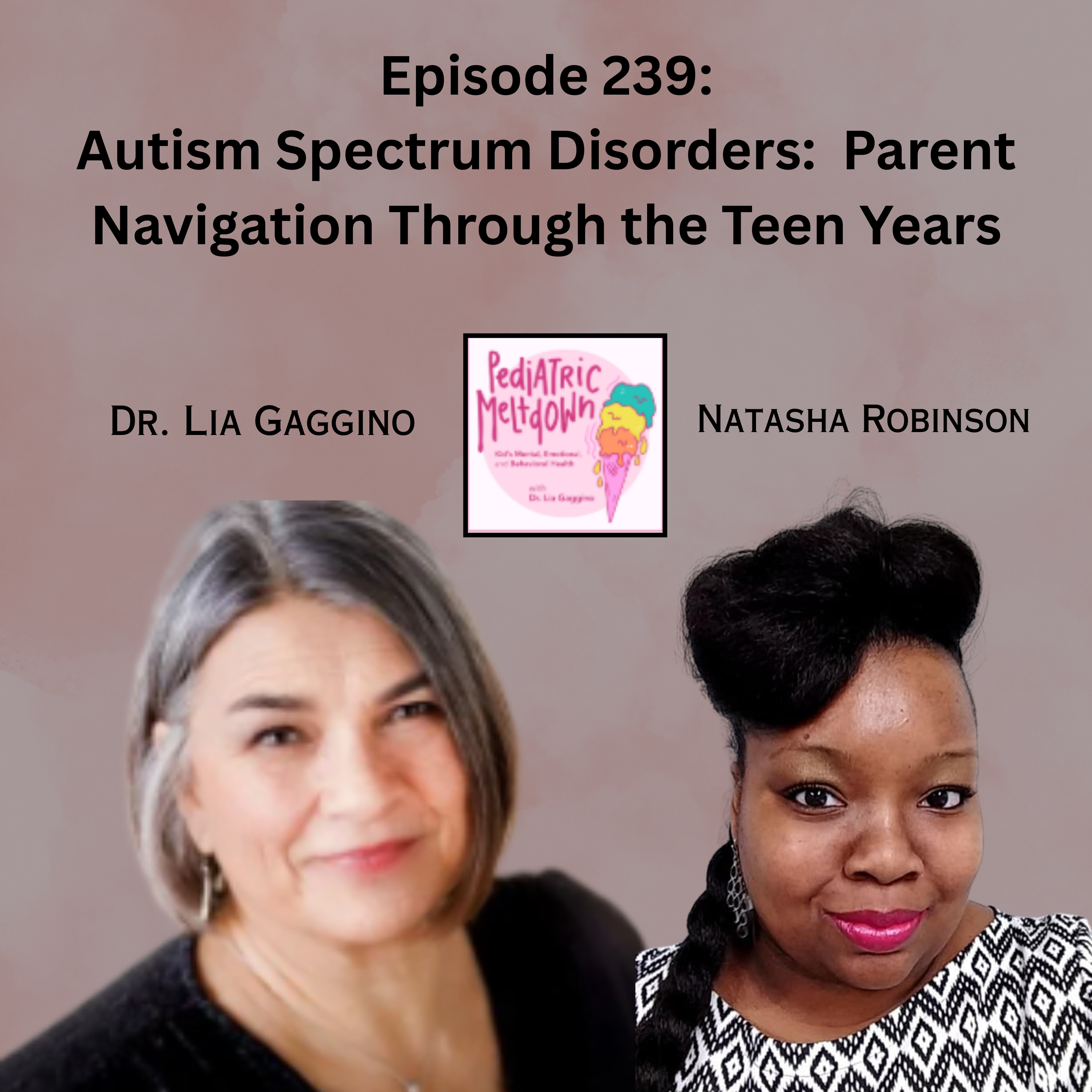Welcome to Pediatric Meltdown, the podcast for busy pediatricians who want to better understand children’s emotional health, behaviors, and gain the skills and knowledge to help them thrive. I am your host, Lia Gaggino. In this episode, we are joined by Dr. Jon Price and Dr. Jenna Vallejo.
Jon Price, MD FAAP, is a Dublin, OH general pediatrician who has been in primary care and pediatric urgent care. He is co-chair of the Ohio Pediatric Council, a dialog group linking pediatricians and insurance plans looking for win/win solutions to improve health care access and coverage for children and attain the financial means for pediatric practices to provide excellent care. He is a member of AAP committees dedicated to child health financing policies and advocacy with public and private health insurance payers. (COCHF,PAAC)
Jenna is the Chief Operating Officer of Potomac Pediatrics in Rockville, MD. She is a healthcare executive that utilizes innovative ideas to revolutionize the patient experience. For the past few years, she has focused on building an integrative mental health model in primary care pediatrics that is accessible & affordable for patients and financially viable for the practice. Jenna is passionate about striving to offer more expansive pediatric services that can be tailored to the patient to optimize patient outcomes while reducing overall medical expenses for families and the healthcare system. Jenna previously served in the United States Navy as a Hospital Corpsman, as well as worked in family practice and urgent care nursing roles. Her clinical experience combined with her healthcare leadership expertise allows her to approach challenges from the patient experience viewpoint and the practices need to achieve financial success.
Join us today as we talk about the importance of insurance credentialing and how physicians should be paid for the extra work that we do.
Key Highlights:
[00:01 – 15:41] The Struggles of Child Poverty in America
- Eligibility of Medicaid and Chip for children in the United States.
- The states have agreed to not disenroll any patients until the government declares that the public health emergency from Covid19 is over.
- · Jon talks about how employers can provide health insurance for their employees
- They discuss how Medicaid and Chip differ, how the program works, and how it might change in the future.
- There is a lot of confusion about how to code for mental health services, and payers are looking at those who are using more upper-level codes
- Pediatricians need to get creative to cover mental health costs
[15:41- 32:14] Mental Health Staff Urge Insurance Companies to Do Better
- How insurance companies could be doing better in terms of reimbursing mental health professionals, and stresses the importance of insurance credentialing
- How care plans for children with mental health issues can be complicated to manage
- After a child leaves the doctor’s office, they are still often linked to the child’s care and may be called upon to assist in the future.
- How to get paid for your phone calls and portal messages.
- Physicians are trying to figure out how to navigate the system and get paid for their work. There is a lot of complexity involved in getting paid for these activities.
- pediatric healthcare is valuable, and it is important to be recognized for what we do.
- Pediatric healthcare professionals need to be prepared to fight for our profession if we want to be recognized and paid fairly.
[32:15 – 1:03:24] Docs Beware: Pre-Audit Denials Can Mean Low Payment
- Being paid quickly can be difficult to achieve, and documentation is key to avoiding timely filing issues
- There are a lot of manpower hours required to get paid, and it can be difficult to keep up with the demand.
- It is important for doctors to have a billing team in place that understands the insurance process and can prioritize payments.
- Mental Health Professionals Urge Reform to Improve Claims Processing
- Therapy Programs Expand to Include Behavioral and ADHD Groups
- Pediatricians can bill for psychiatric collaborative care
- How to Get Paid for Mental Health Services
[1:03:25 – 1:13:24] Final Takeaways
- More than 50% of children are covered by Medicaid
- insurers have created a parallel universe where mental health is carved out from physical health; Different panels of providers, and codes that are covered or not covered.
- Words Matter, We should not be reimbursed for work. We do. We should be paid
- For payers, Pediatrics is a very small part of what they do, and sometimes shortsighted or not prioritized.
- Make full use of the codes that you can use. And this is primarily when we’re looking at mental health coding for a time remembered to capture all the work that you’re doing
- Take caution and reason to review your billings.
- 2023 may bring new coding options.
- Get creative rather than shying away
- the practice not only covered the cost of their mental health professionals but realized a profit.
- Consider group therapy
- Integrated behavioral health is worth every single penny.
- Be prepared to manage and monitor. When you’re contracting with payers.
- Pediatricians partner up with your pair advocacy councils on the AAP chapter level
- Start with one thing, monitor and build it out and give yourself some time to do it.
- Use your market share impact with payers. If you’re covering a lot of kids in your community, use that to your advantage.
- There is power in numbers. Get savvy and get paid for the work that you do, because it is critical to the kids that we see.
Connect with Dr. Jenna Vallejo through Facebook, Instagram, and LinkedIn
Connect with Dr. Jon Price through nationwidechildrens.com
Key quotes:
“It takes a lot of practice of sending claims out, seeing what gets paid, what doesn’t get paid, and kind of working the system because you cannot call the insurance company and just get a clear-cut answer. “ – Dr. Jenna Vallejo
“The value of what we do has an impact. We’re not just budget dust to some people.”
– Dr. Jon Price
THANK YOU FOR YOUR SUPPORT!
Pediatric Meltdown was listed as a Top 20 Pediatric Podcast on FeedSpot.
If you’d like to connect with me, you can find me on LinkedIn, Facebook, Instagram, and Twitter, or email me at [email protected] or [email protected]. To learn more about me visit https://www.medicalbhs.com/
LOVE WHAT YOU HEARD? Leave us a 5-star review so we can continue to provide you with great content. Share this episode and help people know more about children’s health and well-being.



